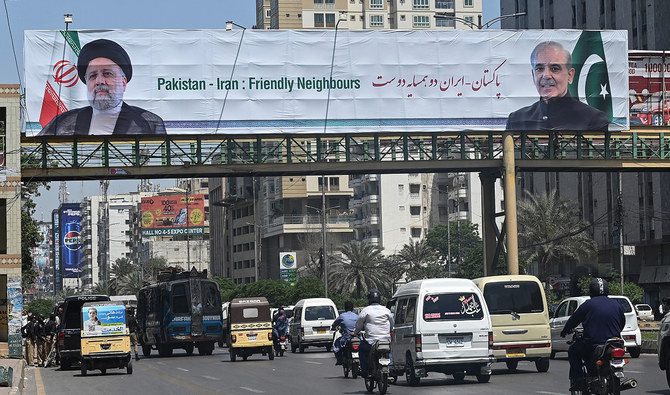ISLAMABAD: Pakistan’s Deputy Prime Minister Ishaq Dar announced on Tuesday his country understood the sanctions risk involved in pursuing the Iran-Pakistan gas pipeline, though he said it would not take “dictation” from other states and follow its own interests.
Earlier this year in March, US Assistant Secretary of State for South and Central Asian Affairs Donald Lu told a Congressional hearing that President Joe Biden’s administration was trying to prevent the construction of the pipeline project that was agreed between the two countries in 2009.
His statement followed Pakistan’s decision to build an 80-kilometer pipeline segment from its border with Iran to the port city of Gwadar in the first phase.
Recent media reports also indicated the government was deliberating over engaging an international law firm to seek US sanctions waiver to implement the project.
“We are not concerned with what other countries say about the Iran-Pakistan gas pipeline project,” Dar said during a media talk in Islamabad. “We must prioritize our own interests, honor our commitments, and make decisions based on Pakistan’s interests.”
“We won’t be dictated to, nor will we allow anyone to veto our decisions,” he continued. “Pakistan is a sovereign nation, and we expect others to respect our sovereignty just as we respect theirs. The government will make the final decision on the IP gas pipeline.”
The deputy prime minister said the Iranian president visited Pakistan with sincerity, and the government conducted meetings and dialogues with him in a cordial environment.
“This project has long-standing complications, including sanctions from other countries, but we will prioritize Pakistan’s interests when making decisions about it,” he added.
The Iran-Pakistan gas pipeline, known as the Peace Pipeline, has faced significant delays in the past due to several reasons that include funding challenges.
Pakistan’s defense minister Khawaja Muhammad Asif also said last month his country had the right to buy gas at competitive rates from neighboring countries amid its ongoing economic problems.
Pakistan acknowledges sanctions risk for Iran gas pipeline, rejects foreign ‘dictation’
https://arab.news/gx3nn
Pakistan acknowledges sanctions risk for Iran gas pipeline, rejects foreign ‘dictation’

- Ishaq Dar says Pakistan will prioritize its own interest over the issue as a sovereign state
- The pipeline project has faced delays for several reasons including funding challenges
IMF warns against policy slippage amid weak recovery as it clears $1.2 billion for Pakistan

- Pakistan rebuilt reserves, cut its deficit and slowed inflation sharply over the past one year
- Fund says climate shocks, energy debt, stalled reforms threaten stability despite recent gains
ISLAMABAD: Pakistan’s economic recovery remains fragile despite a year of painful stabilization measures that helped pull the country back from the brink of default, the International Monetary Fund (IMF) warned on Thursday, after it approved a fresh $1.2 billion disbursement under its ongoing loan program.
The approval covers the second review of Pakistan’s Extended Fund Facility (EFF) and the first review of its climate-focused Resilience and Sustainability Facility (RSF), bringing total disbursements since last year to about $3.3 billion.
Pakistan entered the IMF program in September 2024 after years of weak revenues, soaring fiscal deficits, import controls, currency depletion and repeated climate shocks left the economy close to external default. A smaller stopgap arrangement earlier that year helped avert immediate default, but the current 37-month program was designed to restore macroeconomic stability through strict monetary tightening, currency adjustments, subsidy rationalization and aggressive revenue measures.
The IMF’s new review shows that Pakistan has delivered significant gains since then. Growth recovered to 3 percent last year after shrinking the year before. Inflation fell from over 23 percent to low single digits before rising again after this year’s floods. The current account posted its first surplus in 14 years, helped by stronger remittances and a sharp reduction in imports. And the government delivered a primary budget surplus of 1.3 percent of GDP, a key program requirement. Foreign exchange reserves, which had dropped dangerously low in 2023, rose from US$9.4 billion to US$14.5 billion by June.
“Pakistan’s reform implementation under the EFF arrangement has helped preserve macroeconomic stability in the face of several recent shocks,” IMF Deputy Managing Director Nigel Clarke said in a statement after the Board meeting.
But he warned that Islamabad must “maintain prudent policies” and accelerate reforms needed for private-sector-led and sustainable growth.
The Fund noted that the 2025 monsoon floods, affecting nearly seven million people, damaging housing, livestock and key crops, and displacing more than four million, have set back the recovery. The IMF now expects GDP growth in FY26 to be slightly lower and forecasts inflation to rise to 8–10 percent in the coming months as food prices adjust.
The review warns Pakistan against relaxing monetary or fiscal discipline prematurely. It urges the State Bank to keep policy “appropriately tight,” allow exchange-rate flexibility and improve communication. Islamabad must also continue raising revenues, broadening the tax base and protecting social spending, the Fund said.
Despite the progress, Pakistan’s structural weaknesses remain severe.
Power-sector circular debt stands at about $5.7 billion, and gas-sector arrears have climbed to $11.3 billion despite tariff adjustments. Reform of state-owned enterprises has slowed, including delays in privatizing loss-making electricity distributors and Pakistan International Airlines. Key governance and anti-corruption reforms have also been pushed back.
The IMF welcomed Pakistan’s expansion of its flagship Benazir Income Support Program, which raises cash transfers for low-income families and expands coverage, saying social protection is essential as climate shocks intensify. But it warned that high public debt, about 72 percent of GDP, thin external buffers and climate exposure leave the country vulnerable if reform momentum weakens.
The Fund said Pakistan’s challenge now is to convert short-term stabilization into sustained recovery after years of economic volatility, with its ability to maintain discipline, rather than the size of external financing alone, determining the durability of its gains.










